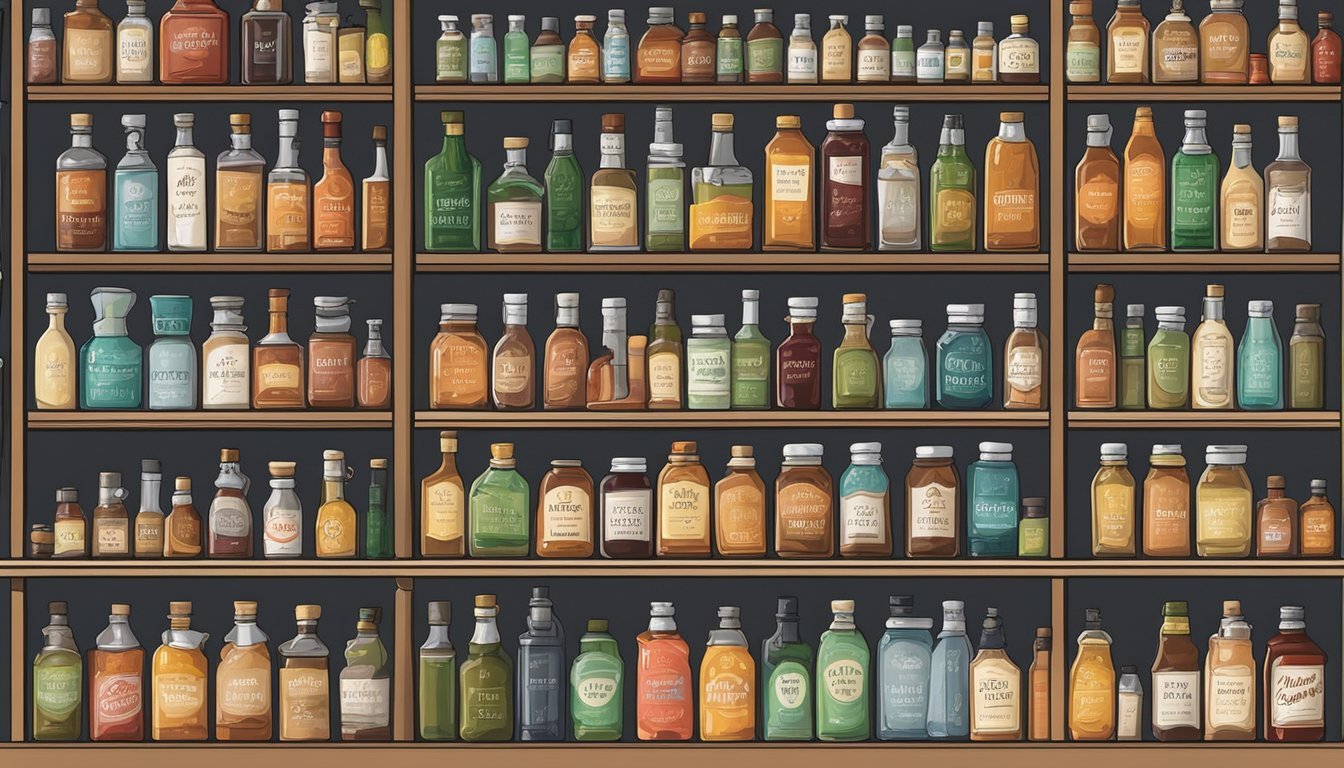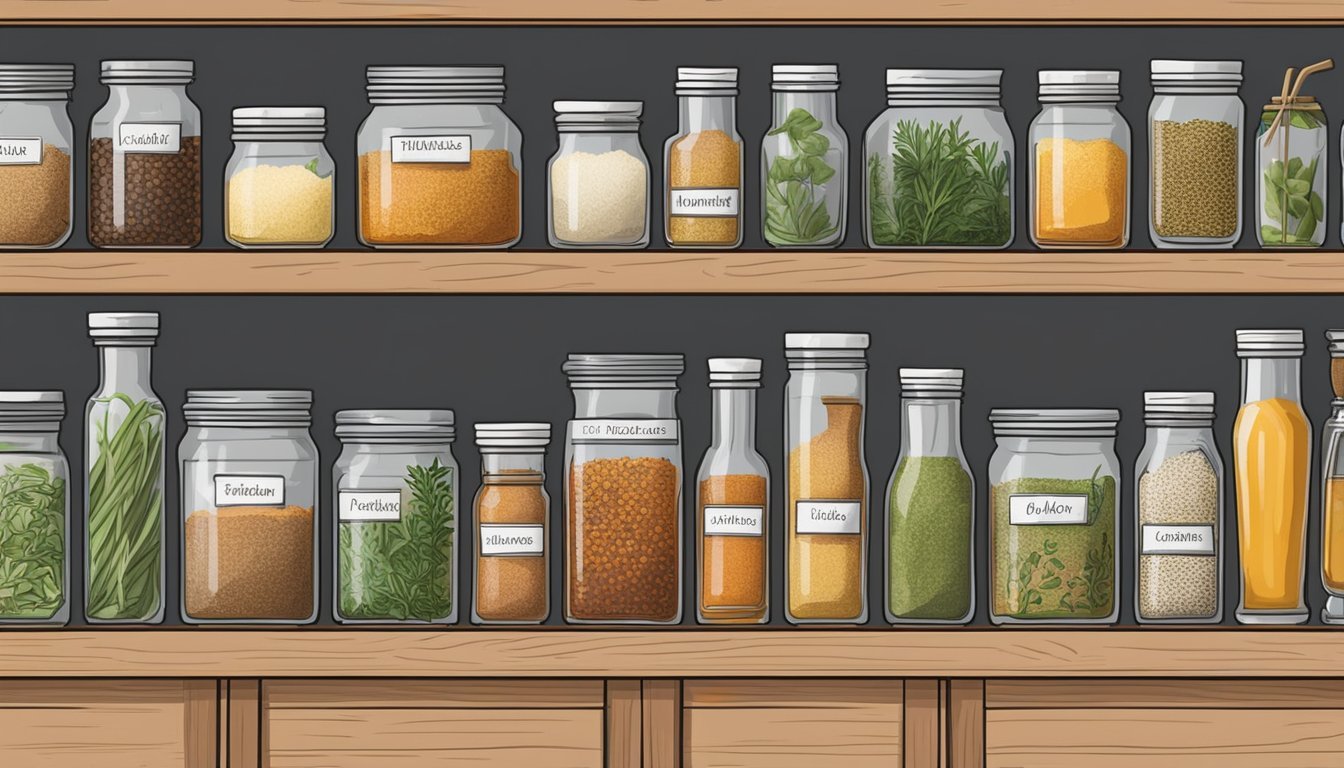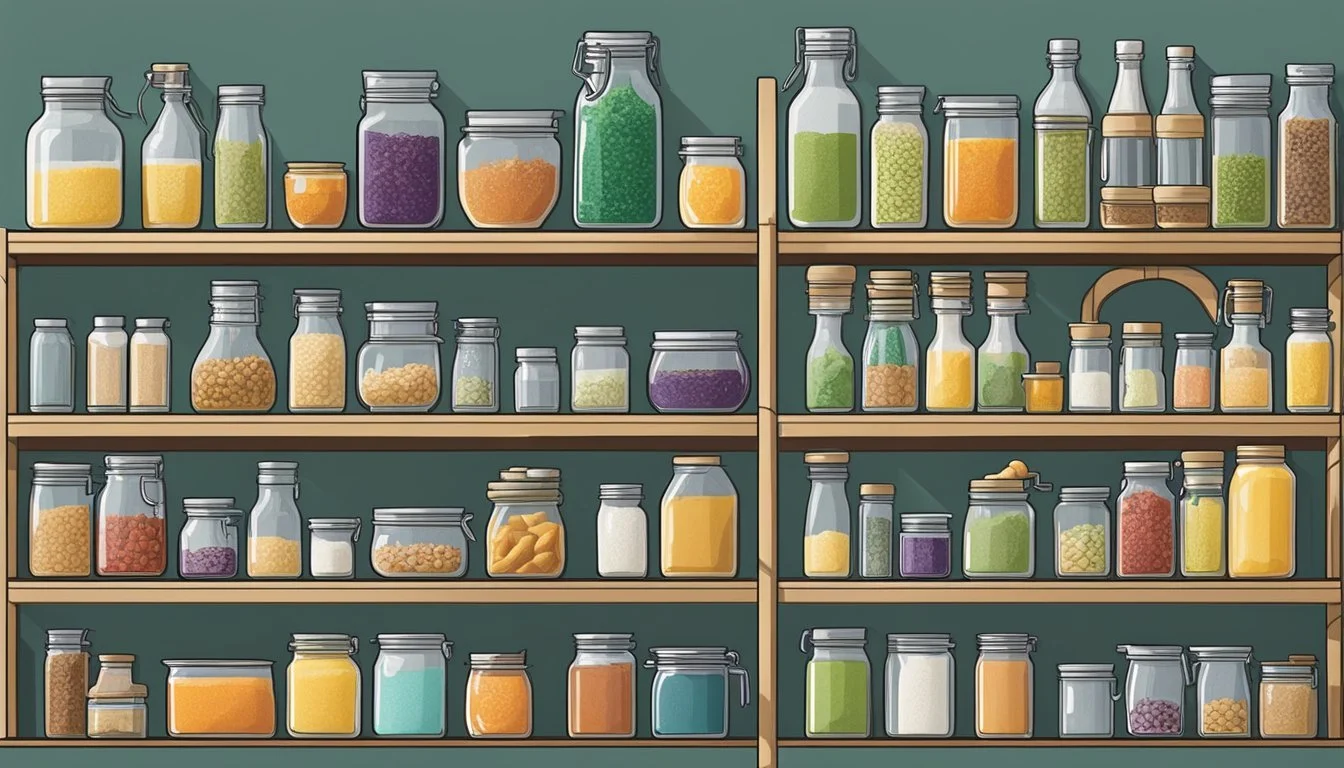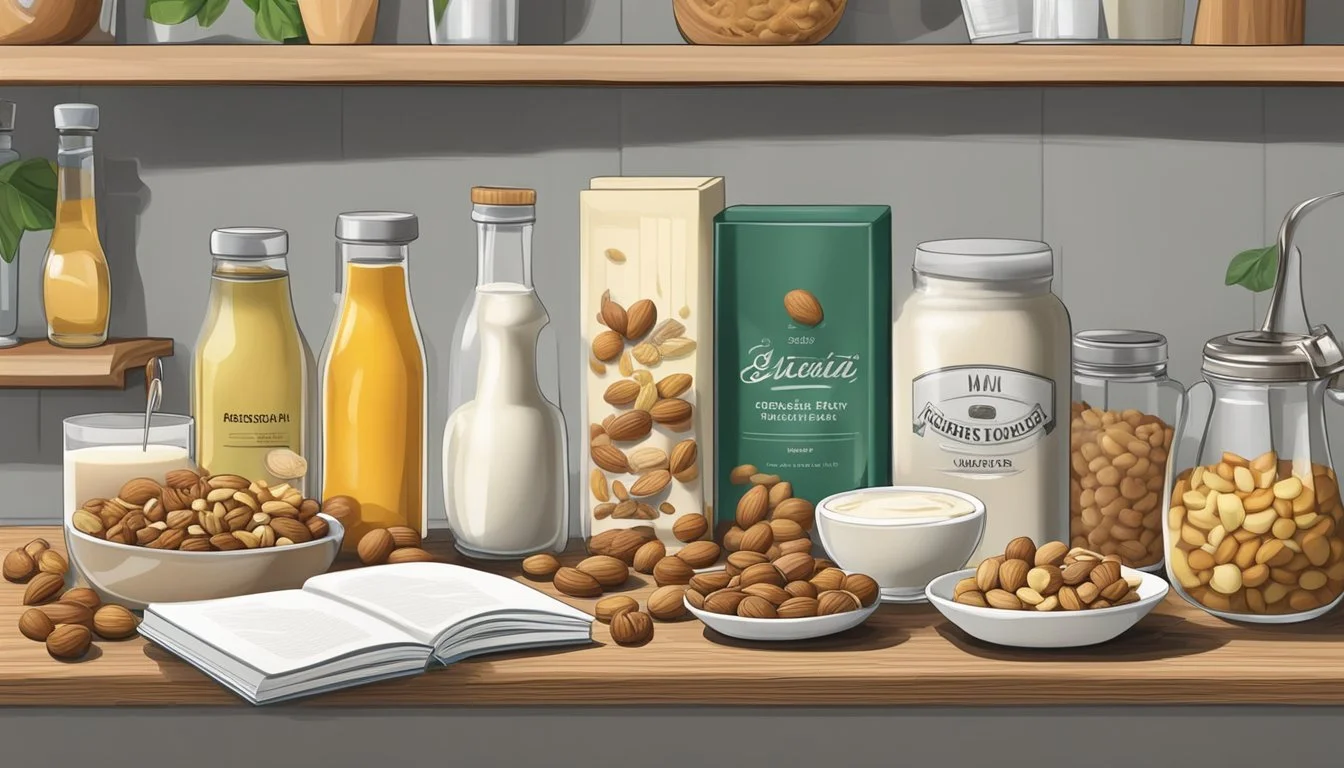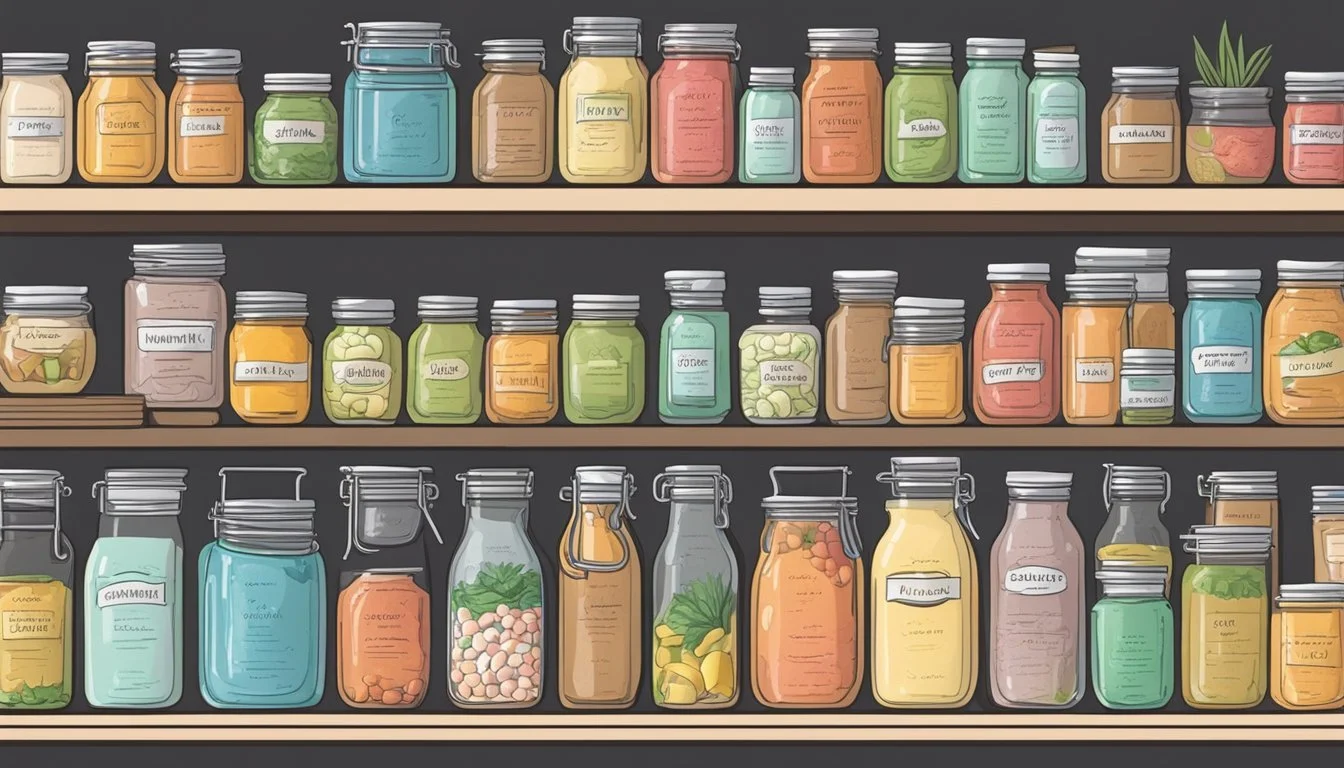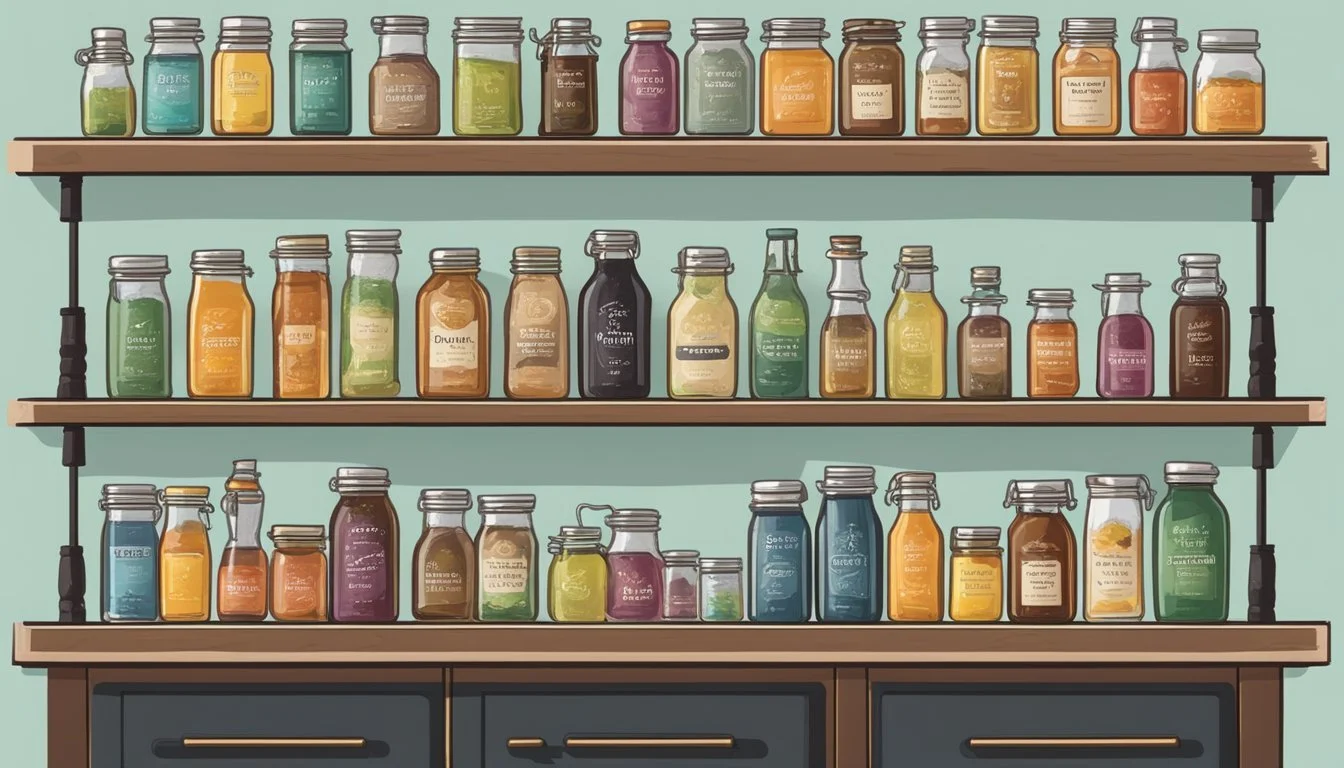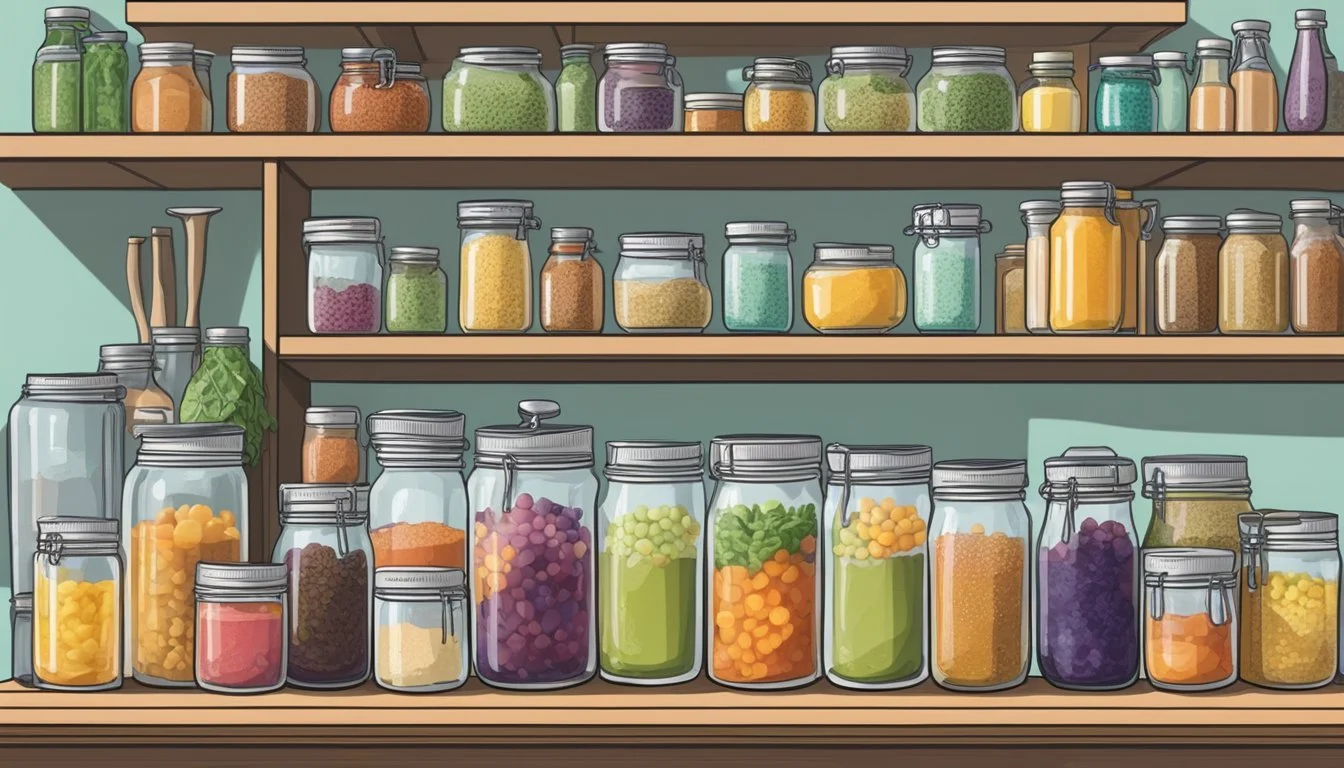Pantry Staple Homemade Cocktail Mixer Recipes
Elevate Your Home Bar
Perfecting the art of cocktail making at home has become a popular endeavor, especially when pantry staples can be transformed into delightful mixers. Handcrafting mixers using items from the pantry not only elevates the cocktail experience but also offers a canvas for creativity and personal taste. These homemade concoctions can match and sometimes surpass the quality of store-bought versions by offering a fresher flavor without the added preservatives.
Creating cocktail mixers from scratch allows for customization according to individual preferences, dietary needs, and the utilization of available ingredients. With the ability to control the sweetness, acidity, and flavor profile, home bartenders are empowered to tailor their cocktails to their specific liking. Furthermore, these homemade mixers often call for simple ingredients, such as a basic syrup base, fresh or frozen fruits, herbs, and spices, lending themselves to an endless array of possibilities.
From the classic simple syrup to more complex flavored concoctions, these mixers are
Essentials of Homemade Cocktail Mixers
Creating homemade cocktail mixers is an art that elevates any drink. It revolves around a solid base of pantry staples and a keen understanding of flavor pairings. By mastering these essentials, any mixologist can craft a variety of versatile and delicious mixers.
Core Ingredients for Versatility
At the heart of homemade cocktail mixers are the core ingredients that offer versatility and are commonly found in most pantries. These essentials include:
Sugar: A critical component for balance in cocktails; it is often used in the form of simple syrup.
Citrus: Provides acidity and brightness to mixers; commonly used citrus fruits include lemons, limes, and oranges.
Fruits and Spices: Used to infuse different flavors; they can be tailored to the season and personal taste preference.
For instance, here's a simple table outlining how to create a basic simple syrup:
Ingredient Quantity Instructions Sugar 1 part Combine with water in a 1:1 ratio. Water 1 part Heat until sugar dissolves. Cool before using in drinks.
Understanding Flavors and Pairings
It's not just about mixing sweet, sour, or bitter elements; understanding how they interact is key. Ingredients should complement each other, not compete. For instance:
Citrus juices, such as lemon or lime, add a tangy note that cuts through the sweetness of syrups.
Sugar, in the form of simple syrup, can soften the sharpness of alcohol and mellow tart flavors.
Introducing spices like cinnamon or nutmeg with citrus creates a layered taste profile, suitable for a vast array of cocktails. Pairings work best when there's a harmony between the flavors, each enhancing the other without overpowering.
Alcohol-Based Mixers
Crafting your own alcohol-based mixers transforms simple spirits into complex, flavor-packed components of any cocktail menu. This section covers the methodology for three key homemade mixers, each enhancing your beverages with a personalized touch.
Infusing Spirits
Infusing spirits is a simple way to impart deep flavors into alcohol such as vodka, gin, or rum. Ingredients like lemongrass, ginger, or vanilla bean steep in the spirit over a period, usually ranging from a few days to several weeks. For instance, lemongrass-ginger tequila can be made by adding chopped lemongrass and ginger to a bottle of tequila and allowing the flavors to meld.
Creating Bitters
Bitters are concentrated infusions that provide a burst of flavor and complexity to cocktails with just a few dashes. They typically combine high-proof alcohol with a variety of botanicals, spices, and aromatic ingredients. A basic formula might include alcohol like high-proof grain spirits infused with botanicals such as citrus peels, and spices.
Crafting Artisanal Liqueurs
Liqueurs combine alcohol with sugar and a range of flavorings, from fruit to herbs, to create sweet and aromatic mixers. One can make a homemade limoncello by steeping organic lemon zest in high-proof vodka, then sweetening with a simple syrup. Artisanal liqueurs achieve their best flavor profile after an aging period, allowing all the elements to harmoniously blend.
Non-Alcoholic Additions
Creating robust and flavorful non-alcoholic mixers for cocktails often involves combining fresh ingredients with the right balance of sweetness and acidity. These mixers can elevate a simple drink into a sophisticated concoirelieur-like experience, even without the presence of alcohol.
Fresh Juices and Purees
Using fresh juices and purees from ripe fruits can add both vibrant color and natural sweetness to drinks. These fresh components not only provide a richer flavor but also offer a nutritional boost. For instance, one could squeeze lemon juice for its zesty tang or blend up peaches for a sweet, grilled peach puree to mix into a mocktail.
Juice: Freshly squeezed for maximum flavor; consider lemon, lime, orange, or grapefruit.
Purees: Can be made from almost any fruit; berries, mangoes, and peaches are popular choices.
Syrups and Sweeteners
Syrups and sweeteners are the backbone of a well-crafted cocktail mixer, balancing acidity and adding depth. One can create a simple syrup by dissolving equal parts sugar and boiling water. To infuse more complexity, ingredients such as thyme, vanilla, or even jalapeño can be steeped in the warm syrup. Artisanal touches come from incorporating alternative sweeteners like honey or jam for a unique twist.
Simple Syrup: A fundamental component; dissolves better than granulated sugar.
Infused Syrups: Enhance with herbs, spices, or fruit zest.
Jam: Blends sweetness and fruit flavor; best when melted and strained to remove solids.
Acids and Sours
The inclusion of acids and sours is essential for replicating the zing and freshness of an alcoholic cocktail. The sharpness of lemonade or the tartness of a sour mix can mimic the complexity that spirits bring. Vinegars, such as apple cider or white wine vinegar, can be used in smaller quantities to impart a subtle bite, essential for drinks like a non-alcoholic Bloody Mary or shrub.
Lemonade: Offers sweetness with a citric bite; homemade is preferred for less sugar and fresher taste.
Sour Mix: A combination of citrus juice and syrup; handy for multiple cocktails.
Vinegar: Used in shrubs; a dash can add a complex sour note.
Herbs and Spices
Cocktail enthusiasts often turn to herbs and spices to transform simple ingredients into complex, aromatic mixers. These botanicals can elevate the flavor profile of cocktails, adding depth and character to homemade mixers with just a few pantry staples.
Botanicals in Cocktails
Incorporating botanicals such as cardamom, anise, cinnamon, and cloves can add warm, spicy notes to cocktails. Fresh ginger, with its fiery kick, enhances both hot and cold mixers. Botanicals can be muddled, steeped, or infused, and are essential in classics like mulled wine and masala chai-inspired beverages.
Homemade Flavored Salts
Flavored salts can add a unique touch to the rim of a cocktail glass, offering both visual appeal and taste enhancement.
Chili salt: Combine ground dried chilies with salt.
Citrus salt: Zest lemons, limes, or oranges, and mix with salt.
Herb salt: Blend dried rosemary, thyme, or basil with salt.
These combinations should be ground together to allow the flavors to meld before using them as a rimming salt for a burst of flavor with each sip.
Spice Infusions
Creating a spice infusion involves gently heating spices to release their essential oils into a liquid.
Simple Syrup Infusion:
1 cup water
1 cup sugar
Desired spices (for example, a stick of cinnamon or a few slices of fresh ginger)
Boil water and sugar with your chosen spices, then remove from heat, cover, and let it steep. Once cooled, strain out the spices and use the syrup to sweeten and flavor a variety of cocktails. This method works well for both bold spices like cinnamon and subtler ones like vanilla, allowing them to infuse cocktails with rich undertones.
Reinventing Pantry Items
Revitalizing your home bar can be as simple as repurposing common pantry stock. The key is to utilize typical ingredients like sauces, preserved fruits, and snacks to craft exceptional cocktail mixers.
Sauces as Mixers
Sauces from your pantry shelf can easily be turned into cocktail enhancers. For a zesty twist, a barbecue sauce can add a smoky layer to a Bloody Mary. Whereas soy sauce offers an umami depth to a whiskey-based cocktail, creating an intriguing savoriness. The simple formula of equal parts sugar and water, crafted into a basic simple syrup, serves as the foundation to infuse these flavors.
Simple Syrup Recipe:
1 cup water
1 cup sugar
Optional: Add a tablespoon of your favorite sauce
Preserved Fruits
The preserved fruits sitting in your pantry are an untapped source of flavor. Canned tomatoes can be pulsed into a savory mixer, perfect for a Michelada or a spin on a classic Bloody Mary. Jams and jellies, particularly those with berry or stone fruit flavors, are excellent for sweetening and flavoring cocktails. They can be stirred into a drink or used as a base for a shrub.
Fruit Mixer Ideas:
Tomato Juice Mixer: Pureed canned tomatoes with a pinch of salt and a dash of hot sauce.
Berry Jam Cocktail Sweetener: Melt jam with a bit of warm water to create a fruit syrup.
Creative Use of Snacks
Snacks may not be an obvious choice for cocktail mixers, but their potential is surprising. Bread crumbs can be toasted and ground with sugar and cinnamon for a unique rimming sugar on a sweet cocktail glass. Nut butter can be emulsified into a rich, nutty concoction to add to a chocolate martini or a dessert drink. These inventive uses of snacks add an unexpected twist and texture to classic cocktails.
Snack-Inspired Rimming Sugar:
1/4 cup bread crumbs, toasted
2 tablespoons sugar
1/2 teaspoon ground cinnamon
By exploring these pantry staples, one discovers that a creative cocktail experience is just a cupboard away. Whether through sauces, preserved fruits, or even snacks, your pantry is filled with potential mixers waiting to elevate your home cocktail game.
Specialty Mixers and Modifiers
Creating specialty mixers and modifiers from scratch can elevate a home cocktail experience. Crafting these components allows one to control the flavors and quality of ingredients, ensuring a unique and tailored drinking experience.
Crafting Tonics and Sodas
Tonics are quintessential for drinks like the classic Gin and Tonic. To create a homemade tonic, one needs quinine, which can often be extracted from cinchona bark. The process involves simmering the bark with citrus zest and spices to release its bitter flavor. To avoid artificial preservatives and enhance the taste, crafting tonic at home allows for the inclusion of natural flavors and sweeteners.
For Sodas: Carbonated water serves as a base for sodas, mixed with a homemade syrup of one's choice. To replicate traditional flavors like lemon-lime, it's as simple as combining fresh citrus juice with a sugar syrup before carbonating.
Homemade Sour Mixes
A sour mix is a blend of lemon or lime juice and a sweetener—usually simple syrup. The homemade version ensures freshness and avoids the high fructose corn syrup found in many commercial mixes. It's a staple for cocktails such as the Whiskey Sour or the Margarita, providing a balanced tartness and sweetness.
Ingredients for a Basic Sour Mix:
1 part fresh lemon juice
1 part fresh lime juice
1 part simple syrup
Mix all ingredients and store in a refrigerator.
Exotic and Unusual Mixers
Exploring exotic and unusual mixers can add a novel twist to one’s cocktail repertoire. Maraschino cherries, for instance, can be homemade by soaking cherries in a Maraschino liqueur-based syrup, which imparts a rich, almond-like flavor that's far from the artificial taste of some store-bought options.
For a tropical flair, one might incorporate fruit purees or infusions with spices not traditionally found in cocktails. These mixers can offer unexpected flavors and aromas, transforming an ordinary drink into an adventurous concoction.
Utilizing Nuts and Dairy
When crafting homemade cocktail mixers, incorporating nuts and dairy can introduce a sophisticated array of flavors and textures. Dairy can add a creamy dimension to your mixers, while nuts can impart a subtle richness and depth.
Nutty Accents
Individuals can enhance their cocktail mixers with the addition of nuts, which infuse a toasted warmth and complexity. For example, creating a nut-infused simple syrup is a straightforward process:
Toast the nuts lightly to boost their flavor.
Combine equal parts sugar and water, then add the toasted nuts.
Simmer until the sugar dissolves and the nutty essence is released.
Strain the nuts and allow the syrup to cool before use.
This syrup can be used to sweeten and flavor cocktails or as a base for homemade orgeat, a traditional almond syrup. Additionally, nut butters can be incorporated into creamy cocktail recipes to add a rich, velvety texture.
Creamy Textures and Layers
Milk plays a crucial role in adding creamy layers to cocktails. Here are a few ways milk can be utilized:
Homemade Cream Liqueurs: Combine spirits with milk, sweetener, and desired flavorings (like chocolate, coffee, or vanilla), then patiently allow the mixture to meld.
Buttermilk in Sour Cocktails: For those seeking a tangy twist, buttermilk provides a unique zing and smoothness to sour-style mixers.
A key technique is proper integration to ensure that dairy components emulsify well with other ingredients, preventing separation and curdling. It is vital to balance the acidity and alcohol content to achieve a seamless texture in the final concoction.
Building a Budget-Friendly Pantry
Creating a budget-friendly pantry for cocktail mixers involves selecting cost-effective ingredients that offer versatility. By focusing on a handful of staples, one can save money while still having the ability to mix a diverse range of drinks.
Cost-Effective Cocktail Ingredients
Here's a list of essential ingredients that are affordable and useful for a variety of cocktail recipes:
Sweeteners:
Sugar: A staple for simple syrups.
Honey: Adds a rich sweetness to drinks.
Acids:
Lemons: Freshly squeezed juice is vital for many classics.
Limes: Key for margaritas and other citrus-based cocktails.
Base Spirits:
Vodka: A versatile spirit that's neutral in flavor.
Rum: Essential for tropical and cola-based drinks.
Modifiers:
Triple Sec: An orange-flavored liqueur used in many cocktails.
Bitters: A few drops can change the profile of your drink.
Maximizing Ingredient Use
One should ensure that each ingredient can be used in multiple recipes to maximize their pantry's efficiency. Here are ways to utilize some of the common pantry staples:
Sugar can be boiled with equal parts water to create a simple syrup, which is the base for many sweetened cocktail mixers.
Lemons and limes not only provide juice but also zest, which can be used to infuse syrups or garnish cocktails.
Vodka and rum serve as the base for numerous cocktails, and infusing them with fruits or herbs can further expand their utility without requiring additional purchases.
Homemade Staples for Cocktails
Creating handcrafted cocktails becomes an art form when one starts incorporating homemade staples. These DIY ingredients not only elevate the quality of the drink but also allow for customization according to personal taste preferences.
Syrups and Sweeteners
Simple Syrup: A fundamental sweetener in mixology, simple syrup is a must-have for any cocktail enthusiast. The basic recipe calls for equal parts of sugar and water, typically one cup of each, boiled until the sugar dissolves, then cooled. This staple can be infused with flavors such as vanilla or herbs for added complexity.
Brown Sugar Syrup: For a deeper, caramel-like sweetness, substituting white sugar with brown sugar achieves a rich syrup, perfect for dark spirits.
Seasonings and Condiments
Homemade Taco Seasoning and Italian Seasoning: A pinch of homemade taco seasoning or Italian seasoning can add an unexpected but delicious twist to bloody marys or savory cocktails. These mixtures usually include a blend of spices such as chili powder, garlic powder, onion powder, paprika (for taco seasoning) and basil, oregano, rosemary, and thyme (for Italian seasoning).
Homemade Seasoning Ingredients Taco Seasoning Chili powder, garlic powder, onion powder, paprika, cumin, salt, pepper Italian Seasoning Basil, oregano, rosemary, thyme, marjoram
Complex Flavor Profiles
Fruit Infusions: Utilizing seasonal fruits to create infusions in syrups or spirits imbues cocktails with a fresh and potent flavor. When fruit becomes a pantry staple, its versatility in drinks is limitless.
Homemade Sauces: Ingredients such as mayonnaise, although not commonly associated with cocktails, can be cleverly used in making a unique homemade Bloody Mary mix. Homemade mayonnaise can add a creamy texture and richness to the concoction.
Buttermilk in Cocktails: While not a standard cocktail ingredient, buttermilk can introduce a tangy and creamy profile to specific cocktail types, such as a variation of a White Russian or in dessert-inspired drinks.
Homemade Granola: A more unconventional addition, homemade granola can be used as a garnish or to add a subtle crunch and nuttiness to the rim of a cocktail glass, pairing exquisitely with autumnal and winter cocktail flavors.
Recipe Section
Creating homemade cocktail mixers with pantry staples is a straightforward and rewarding process. These recipes can enhance classic cocktails and inspire innovative blends with readily available ingredients.
Classic Cocktail Mixers
Simple Syrup
To make a basic simple syrup, mix equal parts water and granulated sugar (1 cup water to 1 cup sugar). Combine these in a saucepan, bring to a boil, then simmer until the sugar dissolves. This syrup serves as a foundation for a myriad of cocktails.
Limoncello
For an authentic touch, lemon zest infused with high-proof grain alcohol forms the base of limoncello. A mix of alcohol, sugar, and water must rest for several weeks to achieve the desired sweetness and potent lemon flavor.
Innovative Homemade Recipes
Fruit-Infused Syrups
Home kitchens can produce a range of fruit-infused syrups using the simple syrup method, adding fruit of choice during the boiling process; berries, citrus, or seasonal fruits offer a personalized twist to any cocktail.
Spiced Cocktail Mixers
By adding spices like cinnamon or clove to the syrup preparation, or incorporating homemade condiments, salad dressings, or sauces, mixologists can create unique flavors that complement spirits like rum, vodka, or gin, elevating simple drinks into sophisticated concoctions.
Home enthusiasts can experiment with these foundations, using them in juices, soups, and gravies, or even repurposing them in non-alcoholic contexts such as creating a fruit casserole topping.
Sustainable and Healthy Choices
When crafting homemade cocktail mixers, one can opt for sustainable practices and healthy ingredients that not only enhance the drink but also contribute to an eco-friendly kitchen.
Avoiding Food Waste
In the fight against food waste, they should consider using overripe or slightly bruised fruit which might not be aesthetically pleasing but still possesses full flavor for mixers. For instance, overripe berries can be mashed and strained to create a vibrant syrup for cocktails. The utilization of every part of produce, like the zest and juice of citrus fruits, ensures that nothing goes to waste. Combining fruit scraps with fresh ginger or herbs can also create infused waters or bases for spritzers, adding a fresh flavor without additional waste.
Sustainable Practices:
Use overripe fruits for syrups.
Employ citrus zest and juice completely.
Create infusions from fruit scraps and fresh ginger.
Natural Alternatives to Store-Bought Mixers
Natural alternatives to store-bought mixers not only save packaging but also avoid the preservatives and artificial flavors often found in commercial products. Homemade mixers utilize fresh, whole ingredients. For example, a simple lemon or lime juice mixed with a bit of sweetener can replace a store-bought sour mix. Consider making a fresh ginger syrup as a healthier alternative to ginger beer, which can be high in sugar. Additionally, homemade salad dressing can double as an inventive mixer, providing an unexpected but delightful twist. When creating mixers that include protein, such as those that might use bulk-purchased nuts, these should be thought of as sustainable options. They take advantage of protein's natural, healthful properties while providing a thicker texture to the drink.
Natural Mixer Alternatives:
Lemon/lime juice with sweetener instead of sour mixes.
Fresh ginger syrup to substitute ginger beer.
Homemade salad dressings can act as mixers.
Bulk-purchased nuts for protein-rich, thicker textures.
Conclusion
Leveraging pantry staples to create homemade cocktail mixers not only adds a personal touch to one's home bar but also demonstrates resourcefulness and creativity. Essentials like sugar, lemons, and bitters can be transformed into a diverse array of mixers that can elevate even the simplest cocktails. Making a simple syrup is straightforward, requiring only equal parts sugar and water, and it serves as a versatile sweetener for countless drinks.
For those seeking a creamier texture in their cocktails, incorporating an egg white is an excellent choice—adding richness and a foamy top layer. Individuals can also explore the depths of flavor by infusing syrups with herbs or spices readily available in their kitchen.
The process of making DIY mixers like limoncello can be an engaging project, with the end product being immensely rewarding despite the waiting time involved. Moreover, creating homemade cocktail mixers from pantry staples is not just a practical solution, but a sustainable one, reducing waste and the need for store-bought alternatives.
Key Ingredient Uses in Mixers Sugar Simple syrups, sweetening agent Lemons Sour component, limoncello Bitters Flavor enhancement Egg Whites Richness, foam for cocktails
One discovers the joy of mixing unique, homemade concoctions and sharing them with friends and family. This practice not only adds value but also becomes a topic of interest and conversation at social gatherings.


